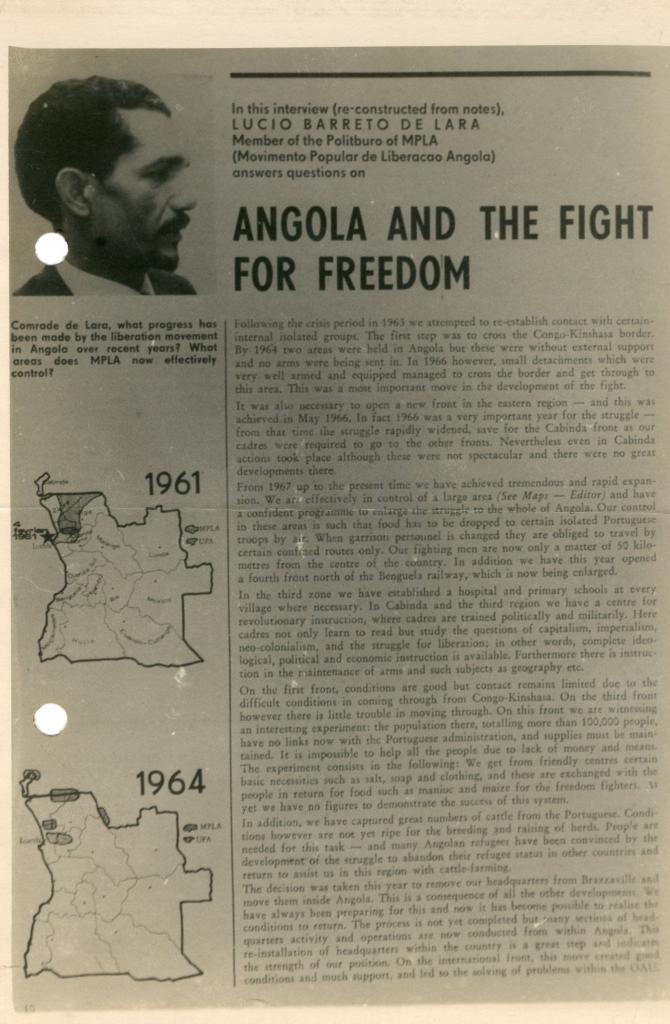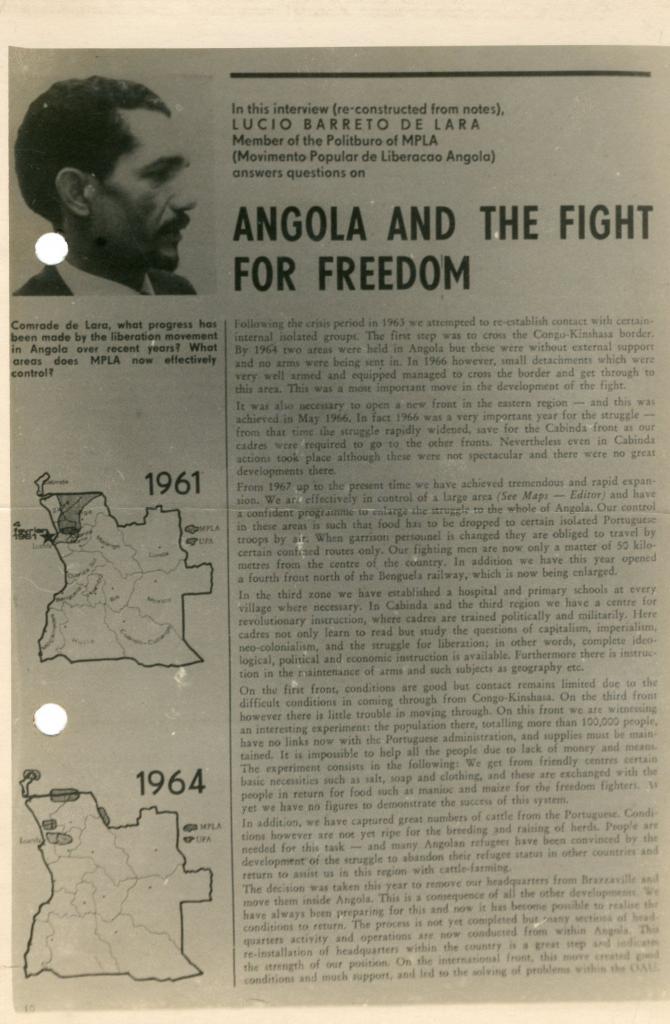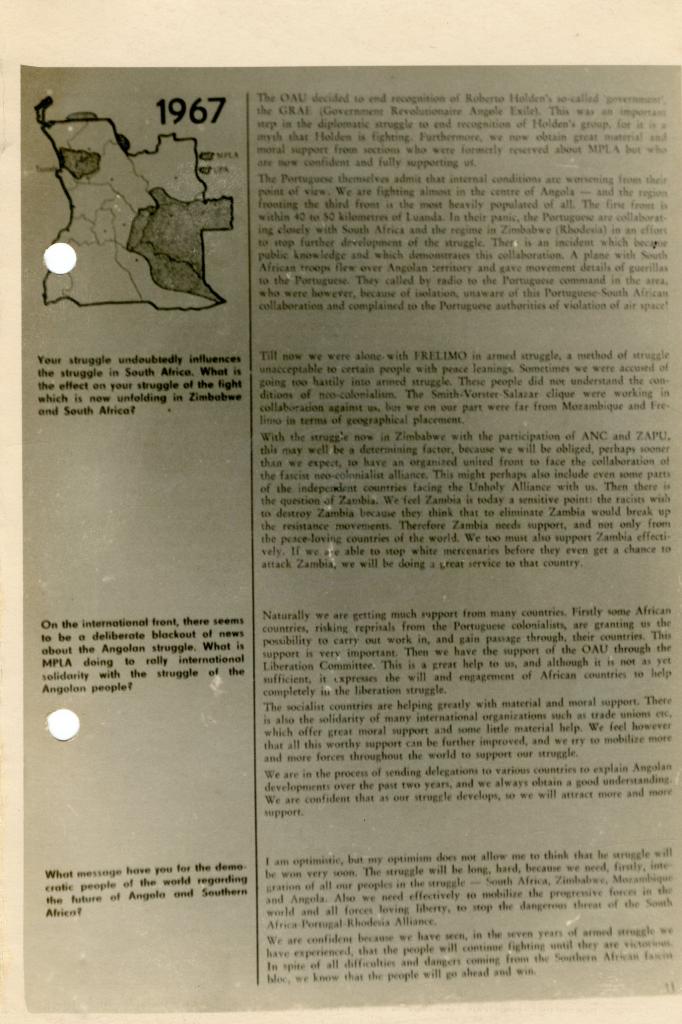Cota
0099.000.052
Tipologia
Entrevista
Impressão
Impresso
Suporte
Papel fotográfico
Data
1967 (estimada)
Idioma
Conservação
Razoável
Fundo
Imagens
2
In this interview (re-constructed from notes).
LUCIO BARRETO DE LARA
Member of the Politburo of MPLA
(Movimento Popular de Libertação de Angola)
answers questions on
ANGOLA AND THE FIGHT FOR FREEDOM
Comrade Lara, what progress has been made by the liberation movement in Angola over recent years? What areas does MPLA now effectively control?
Following the crisis period in 1963 we attempted to re-establish contact with certain internal isolated groups. The first step was to cross the Congo-Kinshasa border. By 1964 two areas were held in Angola but these were without external support and no arms were being sent in. In 1966 however, small detachments which were very well armed and equipped managed to cross the border and get through to this area. This was a most important move in the development of the fight.
It was also necessary to open a new front in the eastern region -- and this was achieved in may 1966. In fact 1966 was a very important year for the struggle from that time the struggle rapidly widened, save for the Cabinda front as our cadres were required to go to the other fronts. Nevertheless even in Cabinda actions took place although these were not spectacular and there were no great developments there.
From 1967 up to the present time we have achieved tremendous and rapid expansion. We are effectively in control of a large area (See Maps -- Editor) and have a confident programme to enlarge the struggle to the whole of Angola. Our control in these areas is such that food has to be dropped to certain isolated Portuguese troops by air. When garrison personnel is changed they are obliged to travel by certain confined routes only. Our fighting men are now only a matter of 50 kilometers from the centre of the country. In addition we have this year opened a fourth front north of the Benguela railway, which is now being enlarged.
In the third zone we have established a hospital and primary schools at every village where necessary. In Cabinda and the third region we have a centre for revolutionary instruction, where cadres are trained politically and militarily. Here cadres not only learn to read but study the question of capitalism, imperialism, neo-colonialism, and the struggle for liberation; in other words, complete ideological, political and economic instruction is available. Futhermore there is instruction in the maintenance of arms and such subjects as geography etc.
On the first front, conditions are good but contact remains limited due to the difficult conditions in coming through from Congo-Kinshasa. On the third front however there is little trouble in moving through. On this front we are witnessing an interesting experiment: the population there, totaling more than 100,000 people, have no links now with the Portuguese administration, and supplies must be maintained. It is impossible to help all the people due to lack of money and mean. The experiment consists in the following: We get from friendly centres certain basic necessities such as salt soap and clothing, and these are exchanged with the people in return for food such as manioc and maize for the freedom fighters. As of yet we have no figures to demonstrate the success of this system.
In addition, we have captured great numbers of cattle from the Portuguese. Conditions however are not yet ripe for the breeding and raising of herds. People are needed for this task -- and many Angolan refugees have been convinced by the development of the struggle to abandon their refugee status in other countries and return to assist us in this region with cattle farming.
The decision was taken this year to remove our headquarters from Brazzaville and move them inside Angola. This is a consequence of all the other developments. We have always been preparing for this and now it has become possible to realize the conditions to return. The process is not yet completed but many sections of headquarters activity and operations are now conducted from within Angola. This re-installation of headquarters within the country is a great step and indicates the strength of out position. On the international front, this move created grand conditions and much support, and led to the solving of problems within the OAU.
The OAU decided to end recognition of Roberto Holden’s so called “government” the GRAE (Government Revolutionaire Angola Exile). This was an important step in the diplomatic struggle to end recognition of Holden’s group, for it is a myth that Holden is fighting. Furthermore, we now obtain great material and moral support from sections who were formerly reserved about MPLA but who are now confident and fully supporting us.
The portuguese themselves admit that internal conditions are worsening from their point of view. We are fighting almost in the centre of Angola -- and the region fronting the third front is the most heavily populated of all. The fire front is within 40 to 50 kilometers of Luanda. In their panic, the Portuguese are collaborating closely with South Africa and the regime in Zimbabwe (Rhodesia) in an effort to stop further development of the struggle. There is an incident which because public knowledge and which demonstrates this collaboration. A plane in South African troops flew over Angolan territory and gave movement details of guerrillas to the Portuguese. They called by radio to the Portuguese command in the area, who were however, because of isolation, unaware of this Portuguese-South African collaboration and complained to the Portuguese authorities of violation of air space!
Your struggle undoubtedly influences the struggle in South Africa. What is the effect on your struggle of the fight which is now unfolding in Zimbabwe and South Africa?
Til now we were alone with FRELIMO in armed struggle, a method of struggle unacceptable to certain people with peace leanings. Sometimes we were accused of going too hastily into armed struggle. These people did not understand the conditions of neo-colonialism. The Smith-Vorster-Salazar clique were working in collaboration against us, but we on our part were far from Mozambique and Frelimo in terms of geographical placement.
With the struggle now in Zimbabwe with the participation of ANC and ZAPU, this may well be a determining fact, because we will be obliged, perhaps sooner than we expected, to have an organized united front to face the collaboration of the fascist neo-colonialist alliance. This might perhaps also include even some parts of the independent countries facing the Unholy Alliance with us. Then there is the question of Zambia. We feel Zambia is today a sensitive point: the racists wish to destroy Zambia because they think that to eliminate Zambia would break up the resistance movements. Therefore Zambia needs support, and not only from the peace-loving countries of the world. We too must also support Zambia effectively. If we are able to stop white mercenaries before they even get a chance to attack Zambia, we will be doing a great service to that country.
On the international front, there seems to be a deliberate blackout of news about the Angolan struggle. What is MPLA doing to rally international solidarity with the struggle of the Angolan people?
Naturally we are getting much support from many countries. Firstly some African countries, risking reprisals from the Portuguese colonialists, are granting us the possibility to carry out work in, and gain passage through, their countries. This support is very important. Then we have the support of the OAU through the Liberation Committee. This is a great help to us, and although it is not as yet sufficient, it expresses the will and engagement of African countries to help completely in the liberation struggle.
The socialist countries are helping greatly with material and moral support. There is also the solidarity of many international organizations such as trade unions etc, which offer great moral support and some little material help. We feed however that all this worthy support can the further improved, and we try to mobilize more and more forces throughout the world to support our struggle.
We are in the process of sending delegations to various countries to explain Angolan developments over the past two years, and we always obtain a good understanding. We are confident that our struggle develops, so we will attract more and more support.
What message have you for the democratic people of the world regarding the future of Angola and Southern Africa?
I am optimistic but my optimism does not allow me to think that the struggle will be won very soon. The struggle will be long, hard, because we need, firstly, integration of all our peoples in the struggle -- South Africa, Zimbabwe, Mozambique and Angola. Also we need effectively to mobilize the progressive forces in the world and all forces loving liberty, to stop the dangerous threat of the South Africa-Portugal-Rhodesia Alliance.
We are confident because we have seen, in the seven years of armed struggle we have experienced, that the people will continue fighting until they are victorious. In spite of all difficulties and dangers coming from the Southern African Fascist bloc, we know that the people will go ahead and win.
Entrevista de Lúcio Lara «Angola and the fight for freedom»
A publicação, total ou parcial, deste documento exige prévia autorização da entidade detentora.


